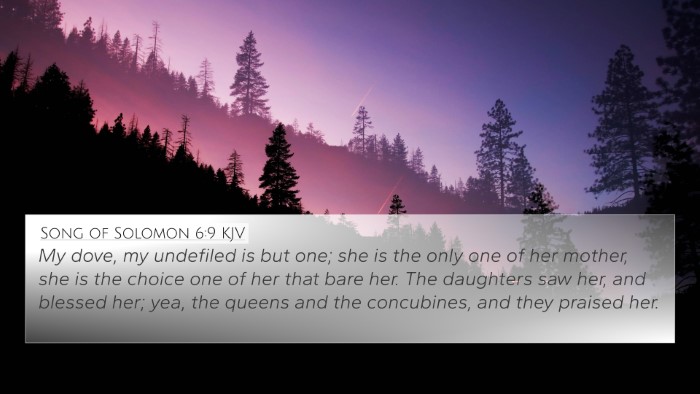Understanding Song of Solomon 5:9
The verse Song of Solomon 5:9 poses an intriguing inquiry regarding the beloved's unique beauty. The question presented is, "What is your beloved more than another beloved?" This line invites exploration into the themes of love and desire, while also prompting reflections on the nature of attraction and the qualities that make someone stand out. Below is a combined interpretation from various public domain commentaries.
Summary of Insights
To comprehend the profound meaning of this verse, we can draw insights from notable commentaries such as those by Matthew Henry, Albert Barnes, and Adam Clarke. Each commentator lends a unique perspective that enhances our understanding.
-
Matthew Henry's Commentary:
Henry emphasizes the question as a call to discern the specific qualities that make the beloved exceptional. It implies that love is not blind, but rather insightful, revealing qualities that attract one to another in a deeply personal way.
-
Albert Barnes's Notes:
Barnes notes that the inquiry reveals an exploration of the beloved's attributes that surpass mere physical traits. It invites the reader to reflect on the spiritual and emotional connections that form the basis of profound love.
-
Adam Clarke's Commentary:
Clarke articulates that the verse symbolizes the relationship between Christ and His Church, highlighting the distinctive nature of Christ’s love, which transcends all other forms of love. This elevates the question to a theological level, inviting reflection on divine love.
Scriptural Cross-References
To provide a deeper context and resonance for Song of Solomon 5:9, consider the following Bible verse cross-references:
- 1 John 4:19: "We love him, because he first loved us." - Illustrates the foundation of love that is initiated by understanding unique attributes of the beloved.
- Song of Solomon 4:7: "Thou art all fair, my love; there is no spot in thee." - Connects with the theme of recognizing beauty in the beloved.
- Philippians 4:8: "Finally, brethren, whatsoever things are true, whatsoever things are honest, whatsoever things are just..." - Encourages reflecting on the admirable qualities of others.
- John 15:13: "Greater love hath no man than this, that a man lay down his life for his friends." - Highlights selfless love, reminiscent of the devotion in a romantic relationship.
- Isaiah 53:2: "For he shall grow up before him as a tender plant, and as a root out of a dry ground: he hath no form nor comeliness." - Displays the contrast of internal versus external beauty.
- Matthew 22:37: "Thou shalt love the Lord thy God with all thy heart, and with all thy soul, and with all thy mind." - Speaks to prioritizing love based on the worthiness of the beloved.
- Colossians 3:2: "Set your affection on things above, not on things on the earth." - Encourages prioritizing divine affection, akin to recognizing the unique beauty of Christ.
Thematic Bible Verse Connections
This verse invites contemplation of the connections between biblical texts relating to love and relationship dynamics:
- Exploring Divine Love: The unique attributes of the beloved resonate with the nature of God's love as revealed in scripture.
- Human Relationships: This verse serves as a model for understanding personal relationships and the qualities that cultivate strong bonds.
- Comparative Analysis with Gospels: Analyzing parallels between the love expressed in Song of Solomon and the teachings of Jesus on love enhances inter-biblical dialogue.
Using Bible Cross-References Effectively
To further study this verse, consider employing tools for Bible cross-referencing:
- Bible Concordance: A useful resource to look up terms and find related verses.
- Bible Cross-Reference Guide: Helps in linking scriptures with thematic connections.
- Bible Reference Resources: Utilize various commentaries and guides for a more in-depth understanding.
Conclusion
Song of Solomon 5:9 invites an exploration of love's deeper meanings, encouraging us to discern what makes a beloved person unique. By engaging with public domain commentaries and cross-referencing with other biblical themes, we deepen our understanding of love—both human and divine. This verse is a testimony to the essence of emotional and spiritual bonds, encouraging believers to appreciate and recognize the attributes that make their beloved distinct.












